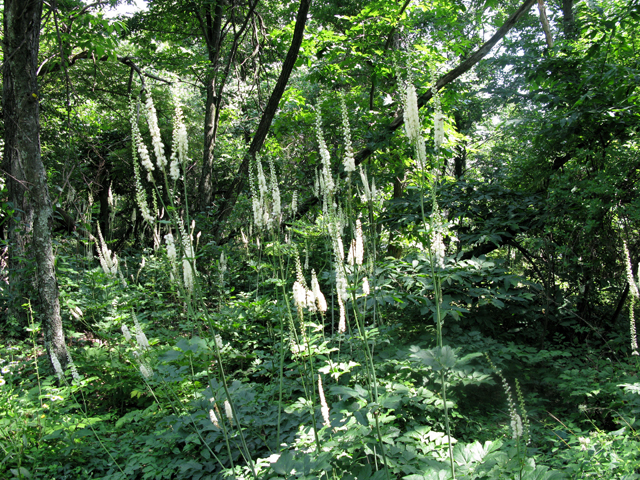[Image: Thomas L. Muller, The Lady Bird Johnson Wildflower Digital Image Library at the University of Texas, Austin]
I have written frequently about black cohosh on Flashfree. And consistently, the relationship between black cohosh and a decline in certain symptoms has been demonstrated in clinical trials. However, here’s the rub: both formulation and dose appears to matter.
About a year ago, findings from scientifically sound (i.e. randomized, controlled, double-blind) trial demonstrated that taking the higher dose formulation of a black cohosh extract (Ze 450) yielded greater benefits in terms of symptoms severity and quality of life in A group of menopausal women. However, what happens over the long term? Do symptoms reappear or do improvements continue? And, is it really true that dose matters?
In a follow up study, researchers selected over four hundred women with menopausal complaints who were seeing about 100 physicians in general and specialty practices. Initially, these women were treated with a high dose of black cohosh root extract (13 mg) for 3 months and either continued with that dosing for another 6 months or were told by their physician to take a smaller, 6.5 mg dose for 6 months. Overall, a majority of women had moderately severe symptoms (most commonly hot flashes, night sweats, insomnia, anxiety and depression) and about two thirds had received previous treatment for them. Importantly, none of the women taking concurrent hormone therapy were included in the final evaluation.
Over the course of 9 months, black cohosh extract significantly decreased symptom severity by roughly 56% as measured by a scientific menopause scale. More improvements continued to be seen over time, regardless of dose. However, almost 90% of women responded to the high dose extract versus 78% of women responding to the low dose; this suggests that greater benefit can be realized among greater numbers of women with a higher dose. Indeed, women taking the high dose, experienced improved relief of a variety of symptoms (e.g. hot flashes, sweating, dizziness, joint and muscle pain, etc) over time. Both doses were also well tolerated in about 95% of women, although the higher dose was associated with some gastro issues in 12 women).
Another interesting point about this study was that it was conducted in what researchers refer to an ambulatory setting, meaning that it was not a controlled trial situation. Because similar results were observed under controlled conditions, conducting the extension under a more realistic environment allowed them to draw the conclusion that the findings reflected those that would likely be seen in the general population.
The black cohosh extract used in these studies is called Cimefemin® uno (6.5 mg) and Cimefemin® forte (13 mg) and is not available in the States, at least not yet. Meanwhile, if you wish to try black cohosh, read through the archives, speak to your practitioner and used a standardized formulation. It looks like it’s a win-win.







